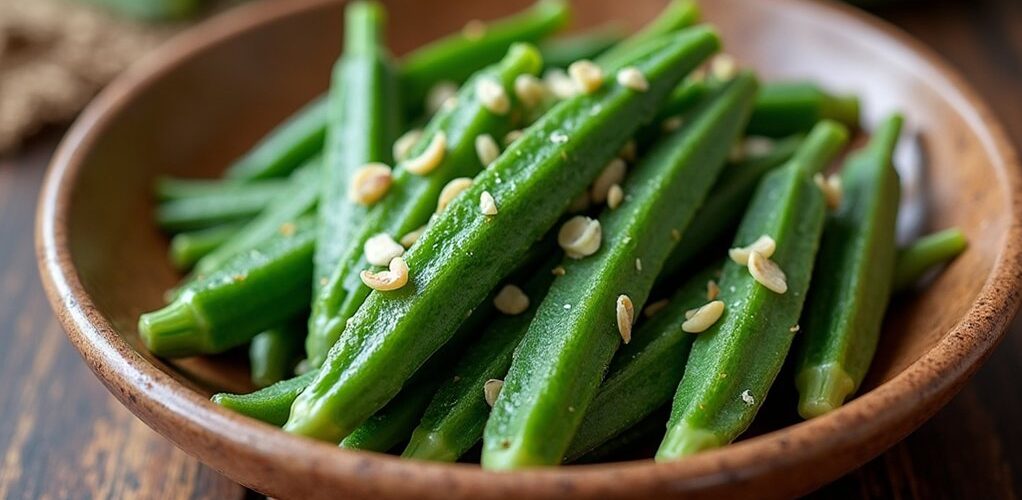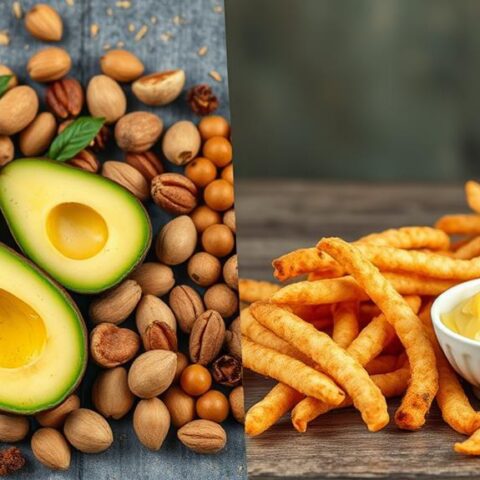
Okra qualifies as a low-carb vegetable with only 4.25 grams of net carbs per 100-gram serving, making it suitable for ketogenic and low-carb diets. The vegetable's high fiber content of 3.2 grams helps slow sugar absorption, while its low glycemic index of 20 supports stable blood sugar levels. When prepared using high-heat methods like roasting or stir-frying, okra offers versatile cooking options while maintaining its nutritional benefits. Understanding okra's complete nutritional profile reveals even more advantages for health-conscious consumers.
Key Takeaways
- Okra contains only 4.25 grams of net carbs per 100g serving, making it suitable for low-carb and ketogenic diets.
- A typical serving of boiled okra (1/2 cup) contains just 3.6 grams of carbohydrates.
- High fiber content (3.2g per 100g) helps offset total carbs and supports digestive health.
- Okra's low glycemic index of 20 helps maintain stable blood sugar levels.
- Okra has moderate carb content compared to other low-carb vegetables like spinach (1.4g) and cauliflower (2.0g).
Understanding Okra's Net Carb Content
Many health-conscious individuals find okra to be an excellent choice for low-carb diets due to its favorable carbohydrate profile. When examining okra's nutritional composition, the vegetable contains approximately 7.5 grams of total carbohydrates per 100-gram serving, with 3.2 grams coming from dietary fiber.
This results in a low net carb content of just 4.25 grams per 100-gram portion, making it particularly suitable for those following a keto diet or other low-carb eating plans.
A typical serving size of 1/2 cup (80g) of boiled okra provides only 3.6 grams of carbohydrates, offering significant health benefits while maintaining digestive health through its high fiber content.
This relatively small carbohydrate contribution allows individuals to easily incorporate okra into their meal plans while staying within strict daily carb limits.
Health Benefits of Adding Okra to Your Diet
While okra's low carbohydrate content makes it an excellent choice for various dietary plans, its impressive array of health benefits extends far beyond its favorable macronutrient profile.
Okra's nutritional value transcends its low-carb appeal, offering a comprehensive range of health advantages for those seeking optimal wellness.
This versatile vegetable supports immune function through its rich content of essential vitamins and minerals, particularly vitamins C and K. Okra's low glycemic index of 20 makes it ideal for blood sugar control, while its abundant fiber content aids digestive health.
The vegetable's antioxidants, including polyphenols and flavonoids, help reduce inflammation and protect cells from damage. Additionally, okra's mucilage has shown potential in managing cholesterol levels, contributing to heart health.
These extensive benefits make okra's inclusion in a balanced diet particularly valuable for those seeking to optimize their overall wellness.
Best Ways to Prepare Low-Carb Okra Dishes
Preparing okra to maximize its low-carb benefits requires specific cooking techniques that preserve its nutritional value while enhancing its natural flavors. High heat cooking methods, such as roasting with olive oil or stir-frying, help minimize the vegetable's characteristic sliminess while maintaining its nutritional benefits.
These techniques also create crispy, flavorful results that complement various protein sources.
For those seeking hearty low-carb meals, okra serves as a versatile ingredient in soups and stews, where it acts as a natural thickener. When incorporating okra into these dishes, verify the pods are completely dry before cooking to reduce excess moisture.
This adaptable vegetable can effectively replace higher-carb alternatives in recipes, making it an excellent choice for those following a low-carb eating plan.
Comparing Okra to Other Low-Carb Vegetables
Okra's 4.25g net carbs per 100g serving positions it favorably among low-carb vegetables, offering a practical option for those following carb-conscious diets. When paired with ultra-low-carb options like spinach (1.4g) or moderate choices like bell peppers (3.2g), okra creates versatile meal combinations that maintain low overall carb counts while maximizing nutritional variety. Understanding these comparative carb values helps in crafting effective low-carb meal plans, where okra can be strategically combined with zucchini, leafy greens, or cruciferous vegetables to achieve ideal nutritional balance while keeping carbohydrates in check. Including non-starchy vegetables like okra in your diet can provide essential vitamins and minerals while ensuring you stay within your carb limits.
Carb Content Comparison Chart
Understanding how okra compares to other low-carb vegetables helps health-conscious individuals make informed dietary choices. A carb content comparison chart reveals that okra contains 4.25 grams of net carbs per 100g serving, positioning it as a suitable low-carb option for keto diets. When examining nutritional profiles across common vegetables, okra's moderate carbohydrate content contributes to balanced, healthy meal plans.
| Vegetable | Net Carbs (g/100g) | Fiber (g/100g) |
|---|---|---|
| Spinach | 1.4 | 2.2 |
| Cauliflower | 2.0 | 2.5 |
| Okra | 4.25 | 3.2 |
This comparison demonstrates that while okra may not have the lowest carb content among low-carb vegetables, its substantial fiber content makes it a nutritious choice for those monitoring their carbohydrate intake.
Best Low-Carb Veggie Pairings
The art of combining low-carb vegetables enhances both nutritional benefits and culinary enjoyment for health-conscious individuals.
For those following keto diets, okra's 4.25 grams of net carbs per 100 grams pairs exceptionally well with even lower-carb vegetable options. Zucchini, containing just 2.1 grams of net carbs, creates a satisfying duo with okra in roasted dishes and stir-fries.
Bell peppers, at 3.1 grams, add vibrant color and complementary flavors when combined with okra in various preparations. For the lowest-carb pairings, consider spinach at 1.4 grams or asparagus at 1.8 grams of net carbs per 100 grams.
These versatile combinations allow for diverse meal planning while maintaining strict carb limits, offering both variety and nutritional balance.
Managing Blood Sugar With Okra
Managing blood sugar effectively involves incorporating foods with natural glucose-regulating properties, and few vegetables offer the remarkable blood sugar benefits of okra. With its low glycemic index of 20, okra helps maintain stable blood sugar levels by preventing post-meal spikes.
The vegetable's fiber content, at 3.2 grams per 100 grams, works to slow sugar absorption in the digestive tract, while its natural mucilage may bind to cholesterol, supporting overall metabolic health. Studies have shown that okra extract can effectively lower blood sugar levels, particularly when consumed with liquid sugar.
It's important to note that regular monitoring of blood sugar is crucial for individuals on the ketogenic diet to avoid complications such as hypoglycemia. However, individuals taking diabetes medications, especially metformin, should exercise caution, as okra may interfere with the medication's blood sugar management properties.
Storage Tips for Maximum Nutritional Value
Preserving okra's impressive nutritional profile requires proper storage techniques and careful handling from purchase to preparation.
To maintain ideal storage conditions and prevent spoilage, careful attention must be given to moisture control and temperature management.
- Select tender green pods without blemishes, ensuring the best flavor and nutritional value from the start.
- Store fresh okra in the refrigerator wrapped loosely in plastic to prevent moisture buildup.
- Limit storage duration to four days maximum to preserve nutrients and tenderness.
- When freezing, blanch the pods before storage and avoid premature washing.
These storage practices help maintain okra's nutritional benefits while preventing common issues like mold growth and texture degradation.
Frequently Asked Questions
Is Okra a Low-Carb?
Okra nutrition confirms its low-carb status, containing only 4.25g net carbs per 100g serving. Its high fiber content makes it ideal for health-conscious diets, comparable to zucchini in cooking methods and recipes.
Is Okra Rich in Carbohydrates?
Okra's nutritional profile shows relatively low carbohydrate content, with only 7g per 100g serving. Its high dietary fiber reduces net carbs, making it suitable for various cooking methods and health-conscious recipe ideas.
What Is the Lowest Carb Vegetable to Eat?
Spinach stands as the best low carb vegetable choice, containing only 1 gram net carbs per 100g. This keto-friendly option offers excellent vegetable nutrition benefits while simplifying carb counting for healthy meal planning.
Is Okra High in Sugar?
Okra's sugar content is particularly low at 1.5 grams per 100 grams. Its high fiber amount and favorable glycemic index make it an excellent choice for sugar-conscious diets compared to other vegetables.
Conclusion
Okra proves to be an excellent choice for low-carb dieters, containing just 4 net grams of carbohydrates per cup while offering substantial fiber, vitamins, and minerals. Its versatility in cooking methods, from grilling to air-frying, makes it an adaptable addition to any meal plan. With proper storage and preparation techniques, okra can be a valuable component of blood sugar management and overall nutritional wellness, particularly when incorporated into a balanced low-carb lifestyle.










No Comments